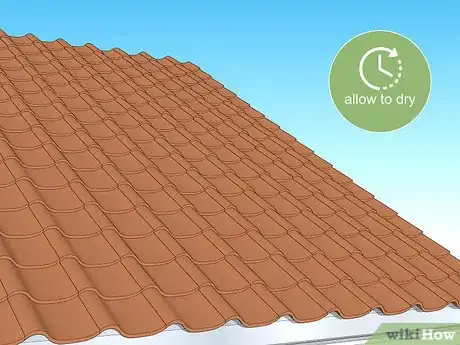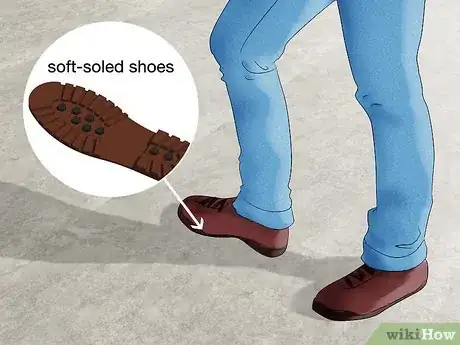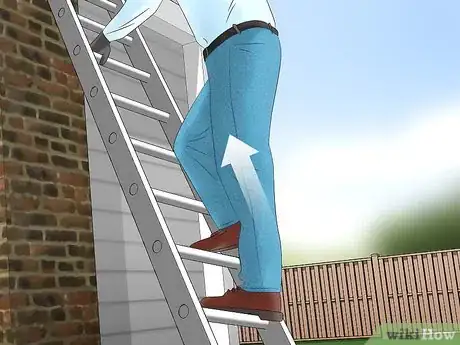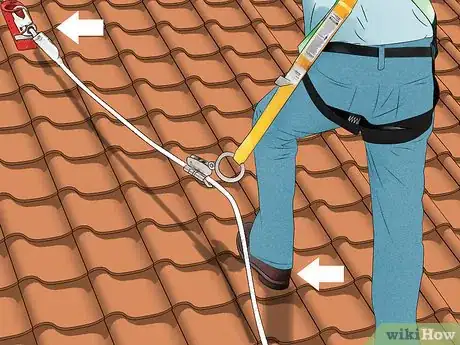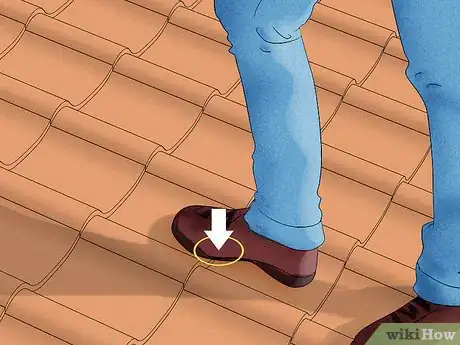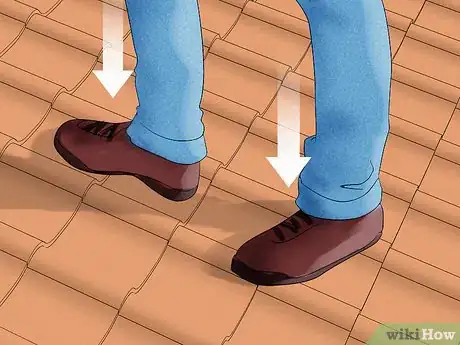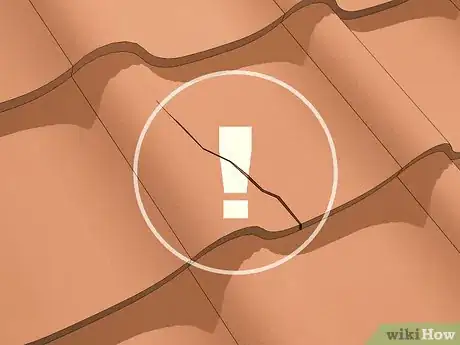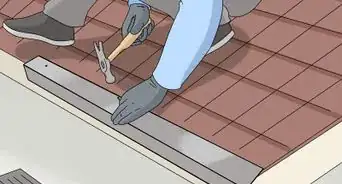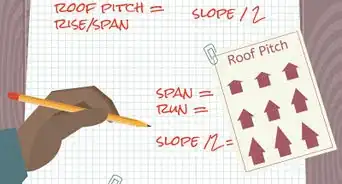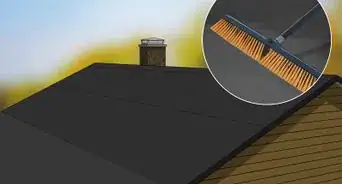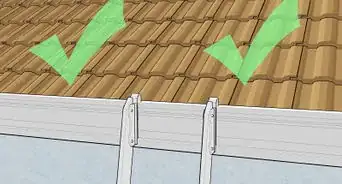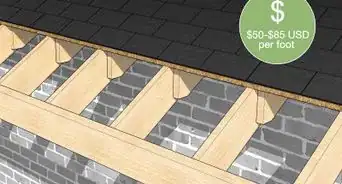This article was co-authored by wikiHow staff writer, Hunter Rising. Hunter Rising is a wikiHow Staff Writer based in Los Angeles. He has more than three years of experience writing for and working with wikiHow. Hunter holds a BFA in Entertainment Design from the University of Wisconsin - Stout and a Minor in English Writing.
This article has been viewed 69,799 times.
Learn more...
Clay and concrete tiles are a great roofing material since they’re more durable than shingles, but they can break or crack if you apply too much pressure while you’re walking on them. While it’s usually best to stay off your roof if possible, you can still walk on the tiles if you need to make repairs. Wait until you have nice weather before safely climbing onto your roof. As you walk on the tiles, be slow and careful when you take steps so you don’t damage them.
Steps
Getting on Your Roof Safely
-
1Wait until the tiles are completely dry before getting on your roof. Tiles have a flat, smooth surface so they don’t offer a lot of grip when you step on them. Once tiles get wet, they become even slicker and could cause you to slip and fall. If it rained recently or your roof is wet for any reason, wait 1-2 days so the tiles have time to dry before you stand on them.
- Never get on your roof while it’s wet since it increases the likelihood that you’ll fall down.
-
2Wear soft-soled shoes to prevent damage to the tiles. Avoid wearing heavy shoes or boots that have a hard sole since they’re more likely to break tiles and you won’t be able to move around as well. Look for shoes that have soft rubber soles with grips, such as sneakers or light work boots, so you get better traction on the tiles while you’re walking on them.[1]
- Don’t wear open-toed shoes like sandals or flip-flops since they don’t offer protection if you accidentally slip or fall down.
Advertisement -
3Climb a ladder to access your roof safely. Choose a ladder that extends 3 feet (0.91 m) taller than the edge of your roof so you can climb it safely. Place the base of the ladder ¼ of its height away from your home and make sure it’s on level ground so it stays sturdy. As you climb the ladder, maintain 3 points of contact at all times so you’re less likely to lose your balance or fall down.[2]
- For example, if you have a 16 ft (4.9 m) ladder, you would place its base 4 feet (1.2 m) feet away from your home.
- Ask a helper to hold the ladder in place while you climb it so it’s less likely to fall down.
Warning: Avoid standing on the top 2 rungs of the ladder since you could easily lose your balance and cause it to fall.
-
4Use a safety harness if you have a steep roof. Safety harnesses anchor you to your roof so if you slip, you won’t fall all the way down to the ground. Put your legs through the loops on the safety harness and tighten them around your thighs. Put the top of the harness around your waist and tighten it so it’s secure. Tie a rope around a sturdy object on your roof, such as a chimney, to use as an anchor to break your fall.[3]
- You can buy a safety harness online or from a home improvement store.
- You can also make your own harness with ropes.
- While you don’t need a safety harness for a roof with a gentle slope, you can still wear one if you want to reduce the risk of falling down.
- If you don’t have a chimney or sturdy object on your roof, slide 2-3 tiles on your roof up so you can access the rafters underneath. Screw a harness anchor onto the rafters and tie the rope to it.
Stepping on the Tiles
-
1Step along the bottom 3 in (7.6 cm) of the tiles. The middle and tops of the tiles don’t have any supports underneath them, so they can break easily if you apply too much pressure. However, the bottom 3 inches (7.6 cm) of the tiles overlap the row underneath them so they have additional support. Take your first step onto your roof so your feet are parallel to the top ridge of your roof and along the bottom edge of the tile. [4]
- Don’t jump or move quickly between the tiles since you could break them if you step down too hard.
Tip: If your tiles have curves or waves, place your feet on the tallest points, or the peaks, rather than the lowest points, called the valleys.[5]
-
2Walk on the balls of your feet to reduce the pressure on the tiles. Since the heels are usually the thickest part of your shoe, they are more likely to break your tiles when you step on them. Apply pressure to the ball of your foot when you step on the tiles so you’re less likely to damage them. When you take a step, slowly lift your foot up to ease the weight off the tile.[6]
- If the roof tiles have curves or waves and they are close together, then place the balls and heels on the peaks.
-
3Distribute your weight evenly to prevent breaking any tiles. Try to balance your weight between both of your feet so you aren’t putting too much pressure on a single tile. If you need to transfer your weight, apply pressure to 1 foot slowly so you don’t put too much force on the foot that’s still planted down.[7]
- Avoid putting both feet on the same tile since it could apply too much pressure to the tile and cause it to break.
-
4Avoid stepping on tiles that are broken or have water channels on them. Inspect the tiles that you want to step on to see if they have any cracks or damage on them. Avoid putting pressure where the tiles intersect or where you notice damage since they could break when you step on them. Stepping on broken tiles can also increase the chance that you’ll slip and fall.[8]
- Avoid stepping on any tiles that are along the edge or ridge of your roof as well.
Warnings
- Avoid stepping in the middle of the tiles since it doesn’t have any support underneath it.⧼thumbs_response⧽
- Never get on your roof while it’s wet since it will be slippery and you could fall down.⧼thumbs_response⧽
Things You’ll Need
- Soft-soled shoes
- Safety harness
- Ladder
References
- ↑ https://homewarranty.firstam.com/blog/roof-maintenance-inspection-tips-home
- ↑ https://www.popularmechanics.com/home/how-to/a9631/dont-be-an-idiiot-how-to-use-any-kind-of-ladder-safely-16123359/
- ↑ https://youtu.be/Bw-0a7TW8E8?t=33
- ↑ https://youtu.be/reK3cqdN5ZY?t=30
- ↑ https://roofgenius.com/RoofInfo/WalkTileRoof.asp
- ↑ https://www.siyanda.org/walk-tile-roof/
- ↑ https://www.siyanda.org/walk-tile-roof/
- ↑ https://www.siyanda.org/walk-tile-roof/
